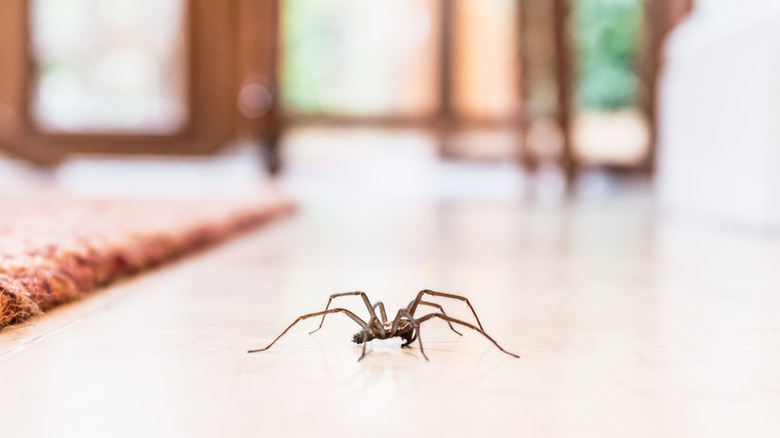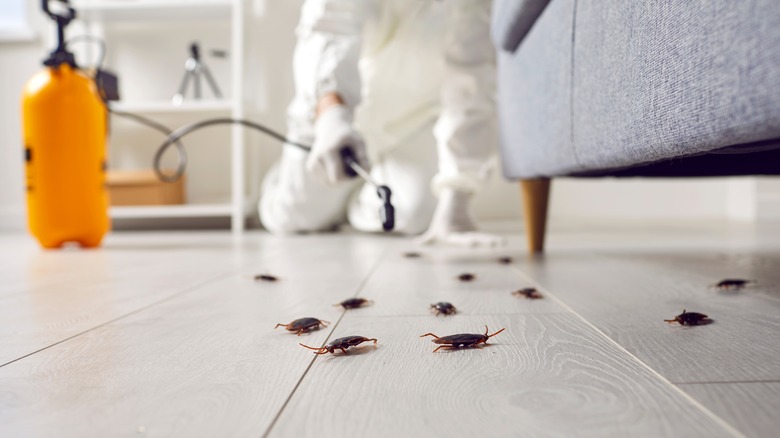Everything Pest Control Companies Don't Want You To Know
No one likes finding a few bugs in their home, let alone facing a major infestation. With so many pest control companies out there, you at least have someone to call who can help you remedy the situation and regain control of your home. But, can you always trust what these companies tell you — or what they neglect to share with you? While professional exterminators certainly serve an important purpose, it is also important to remember that they are in the business of making money.
Sometimes the advice or recommendations they share may be in the best interest of the company, not the best interests of you as the consumer. There are several things you'll want to learn about before calling up your bug extermination company again. This way, you'll be armed with the knowledge you need to determine the best way to deal with any infestations or potential infestations that your home may face.
Not all bugs in the house should be killed
Some bugs in the house can actually be beneficial. Your pest control company might not want you to know this fact, as it can mean decreased business for them. After all, if you're not calling them every time you see an insect, they aren't going to make as much money.
So, which bugs might you actually want to leave alone in your house? There are more than you may think, including a few that might surprise you. Most spiders, for example, are generally harmless to humans. While their eight-legged appearance may look scary, they can actually provide more help than harm by feeding on smaller insects and keeping them from being a problem around the house. Centipedes, praying mantises, and green lacewings are other bugs that can help you keep smaller pests out of the house. They also eat insects, helping you control your bug population naturally.
The sprays pest control companies use can be harmful
Before hiring any pest control company, you'll want to ask a lot of questions about the sprays that they use. Unfortunately, many of these pesticides can still be very harmful. Exposure to some of these products can lead to problems such as eye, nose, or throat irritation, headaches, nausea, dizziness, or feeling weak in the body. They have the potential to cause more serious issues, including an increased risk of cancer or damage to the nervous system, kidneys, or liver.
Even if the company you choose reassures you that their sprays are nontoxic, they still have the potential to pose a threat, particularly if they are not used properly. This can mean using a higher dosage than the product recommends to exterminate faster, or not taking care of the proper safety precautions, such as ventilating the room or covering furniture with tarps so as not to absorb the chemicals. Check to make sure that the person who will be applying the pesticide is knowledgeable, and verify proper use instructions with the company. If you have any doubt over their qualifications, look for another exterminator to help you.
A home inspection alone isn't enough to give you peace of mind before purchasing a new home
If you're purchasing a new home, getting a home inspection is a typical step in the process. While a general home inspector will point out any obvious signs of termite damage, they're not going to be as knowledgeable to identify all pest-related issues. Instead of relying on the general home inspector, it is a good idea to set up a separate pest inspection.
With a professional pest inspection, a qualified individual will perform a more detailed search of the property for any signs of current or past infestation. They'll look at the structure of the home, check for signs of rodents or insects, and provide you with a detailed report. The report will identify potential issues along with recommendations for any needed remediation. The exact parameters of the inspection and report will likely vary based on where you live and which pests are most prevalent in your area. For example, if your house bumps up against the woods, it's to be expected you'll have some spiders in the house, but that doesn't mean you should be overrun with them. If you are, you might have some holes in your exterior. You can use the information from the inspection to help you determine if you should go through with the purchase of the new home or continue your search.
Insects may develop immunity to pesticides
In addition to the potential harm that pesticides can cause, there is another problem with using them in your home. Some insects can develop immunity to the chemicals used in pesticides, meaning they won't even work effectively to remediate a problem. If you think about the theory of evolution and survival of the fittest, the strongest members of a population survive and pass these traits down to future generations.
The same is true of pests and pesticides. Insects or rodents that are able to survive the poisons will live on to mate and produce new pests that are even more resilient. Over time, more and more insects may develop immunity, rendering our current chemical solutions less effective. This is a problem that was actually predicted by Rachel Carson decades ago. At the time, insects were only causing farmers to lose about 7% of their crops. This number has continued to increase, with insects being responsible for wiping out about 13% or more of crops in the past three to four decades, even though higher amounts of toxic chemicals are being used. Because of this, the pest company might need to use even more poisonous options or come back repeatedly before the job is done.
Bug bombs aren't always a good idea
If a pest control company suggests using a bug bomb, you might want to contact another professional for a second opinion. Bug bombs, also known as foggers, have some serious downsides. If they're not used correctly, they can cause breathing problems or irritate your skin. And if food or items that come into contact with food aren't removed from the space, you could inadvertently end up ingesting the chemicals in the bomb.
But, beyond the negative health consequences, foggers aren't always that effective at clearing up an infestation. As with other pesticides, they may not kill all of the insects that are plaguing your home. If even a few survive, they'll continue mating and producing new generations to keep invading. Sometimes, bug bombs have the opposite effect to what was intended. Because these repellents are set off in the middle of a space, any bugs in the vicinity may take cover under your floorboards or inside your walls. This can spread the infestation out over a larger area and may result in the bugs finding new areas that are even harder to access.
The underlying cause of your pest problem could be moisture
Did you know that moisture could be the underlying cause of many infestations? If your pest control company isn't telling you this, and is just getting rid of the bugs that are present, the real problem isn't going to be fixed. Rather, the insects or rodents will just return, requiring you to contact the exterminator once again.
There are several pests that are attracted to moisture. A few include cockroaches, spiders, earwigs, termites, silverfish, mosquitoes, centipedes, ants, and rats. If you've been dealing with any of these, start by clearing up the infestation, then find a solution for the water problem. It will vary depending on the source of the moisture. You may need to contact a plumber if you have leaky pipes, install a sump pump for a wet basement, or set up a humidifier to deal with excessive moisture levels.
There are several natural pest control remedies that you can try on your own
Sometimes, you can clear up an infestation on your own, without the help of a professional exterminator. This is something that you definitely aren't going to hear from a pest control company, as they'd lose your business if they shared it with you. But many natural remedies can be quite effective at getting rid of insects and rodents and keeping them from returning to your property. And even better, these natural repellents don't pose the same risk to your health or the environment that are associated with using chemical pesticides.
Several natural deterrents work for various pests. For example, many insects, including cockroaches, flies, ants, silverfish, and rats, are repelled by spices like cinnamon or cayenne pepper. Liberally sprinkle it over places where you see the most activity. Diatomaceous earth, made up of tiny fossils of diatoms, can also be effective if sprinkled around the area where you're dealing with an infestation. The little fossils are very sharp and will puncture the exoskeleton of any insects that crawl over it. This will cause them to become dehydrated and, eventually, die.
Your habits may actually be attracting more pests to your home
Believe it or not, you may be inadvertently attracting bugs and rodents to your home. For example, did you know that clutter not only makes your home more appealing to pests, but that it can also make it more difficult to discover that you're dealing with an infestation? The bugs can stay hidden among the papers or other items, and they're also more likely to find food or water sources to keep them alive.
Improper food storage is another one of the biggest mistakes that people can make. If the items in your pantry are not stored in an airtight container, you may as well hang a huge "Buffet Open" sign on the door to let pests know they are welcome to eat whatever they want. Another important habit you might want to change is how frequently you take out your trash. If the trash is sitting around too long, the spoiling food inside of it is going to welcome more insects into your home.
Not all pest control companies are the same
Finally, it is important to remember that not all pest control companies are the same. Everyone is going to tell you that they're the best, but there are several things you should consider before hiring a professional exterminator that should help you evaluate your options. First, ask detailed questions about the qualifications and experience of the technicians who would be working at your home. It is important to choose a reputable company with knowledgeable professionals who will be able to recommend the best courses of treatment based on your specific situation.
You'll also want to ask questions about the services each exterminator offers. Do they only use chemical sprays, or are there alternative methods available? Check whether any warranties or guarantees are included with the services. If you experience a reinfestation shortly after treatment, will you need to pay again? Finally, don't forget to consult reviews from past customers. Reading through these can be a good source for learning more about how each company actually treats its customers and how effective their extermination services are.









